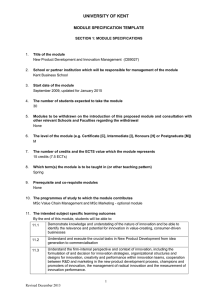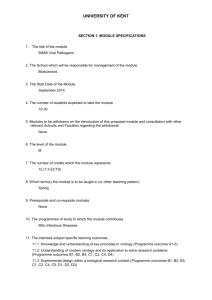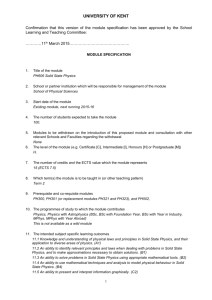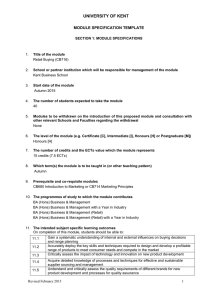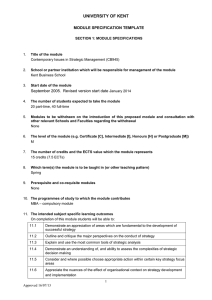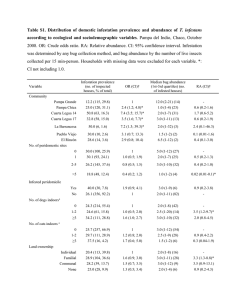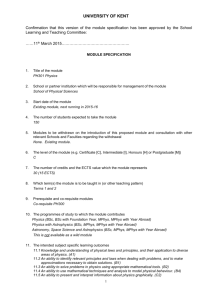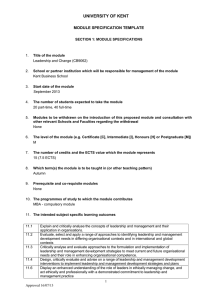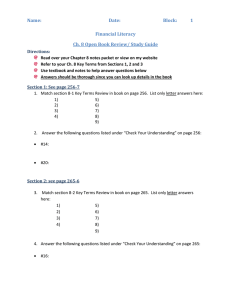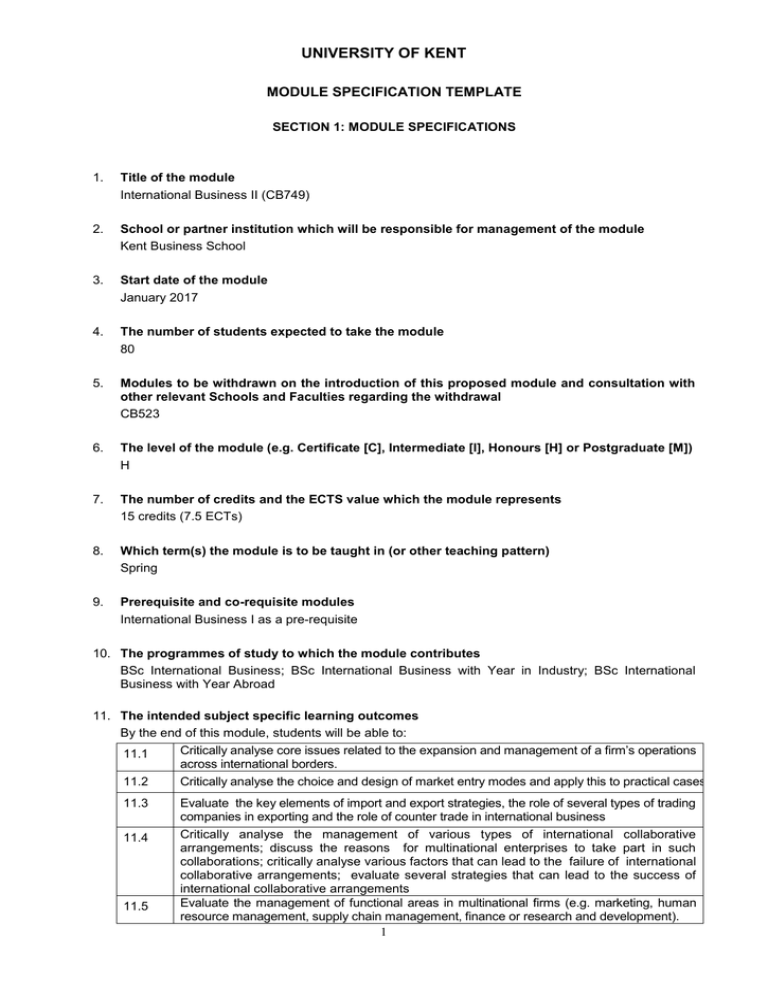
UNIVERSITY OF KENT
MODULE SPECIFICATION TEMPLATE
SECTION 1: MODULE SPECIFICATIONS
1.
Title of the module
International Business II (CB749)
2.
School or partner institution which will be responsible for management of the module
Kent Business School
3.
Start date of the module
January 2017
4.
The number of students expected to take the module
80
5.
Modules to be withdrawn on the introduction of this proposed module and consultation with
other relevant Schools and Faculties regarding the withdrawal
CB523
6.
The level of the module (e.g. Certificate [C], Intermediate [I], Honours [H] or Postgraduate [M])
H
7.
The number of credits and the ECTS value which the module represents
15 credits (7.5 ECTs)
8.
Which term(s) the module is to be taught in (or other teaching pattern)
Spring
9.
Prerequisite and co-requisite modules
International Business I as a pre-requisite
10. The programmes of study to which the module contributes
BSc International Business; BSc International Business with Year in Industry; BSc International
Business with Year Abroad
11. The intended subject specific learning outcomes
By the end of this module, students will be able to:
11.1
Critically analyse core issues related to the expansion and management of a firm’s operations
across international borders.
11.2
Critically analyse the choice and design of market entry modes and apply this to practical cases.
11.3
Evaluate the key elements of import and export strategies, the role of several types of trading
companies in exporting and the role of counter trade in international business
11.4
Critically analyse the management of various types of international collaborative
arrangements; discuss the reasons for multinational enterprises to take part in such
collaborations; critically analyse various factors that can lead to the failure of international
collaborative arrangements; evaluate several strategies that can lead to the success of
international collaborative arrangements
Evaluate the management of functional areas in multinational firms (e.g. marketing, human
resource management, supply chain management, finance or research and development).
1
11.5
UNIVERSITY OF KENT
12. The intended generic learning outcomes
By the end of this module, students will be able to demonstrate:
12.1
The ability to present a logical case/argument
12.2
The ability to plan work, study independently and use relevant resources
12.3
The ability to structure and develop appropriate and effective communications, critically
and self-critically, orally and in writing
The ability to receive and use criticism and advice so as to learn from others
12.4
12.5
The ability to produce work in appropriate formats, demonstrating an
understanding of academic conventions
12.6
The ability to inform decision making by theoretical developments
12.7
The ability to work effectively in teams
13. A synopsis of the curriculum
This module offers a critical analysis of how multinationals select their target markets and modes of
entry and how they manage their various functions in an international context, balancing the needs for
global integration and local responsiveness respectively.
Managing the internationalisation process
Country selection
Choosing and designing entry modes
Managing collaborative arrangements
International marketing
International human resource management
International supply chain management
International finance
Research and development in an international perspective
Managing multinationals using electronic commerce
Managing multinationals responsively
14. Indicative Reading List
Daniels, J.D. and Radebaugh, L.D. (2013) International Business: Environments and Operations,
14th Edition, Upper Saddle River: Pearson Prentice Hall
Ball, D.A. and McCulloch W.H. (2012) International Business: The Challenge of Global
Competition, 13th Edition, London: Irwin/ McGraw-Hill
Hill, Ch. (2012) International Business. Competing in the Global Market, 9th Edition, London: Irwin/
McGraw-Hill
15. Learning and Teaching Methods, including the nature and number of contact hours and the
total study hours which will be expected of students, and how these relate to achievement of
the intended module learning outcomes:
The module will be organised in lectures and seminars dealing with topical as well as ‘classical’
case studies. Students will be encouraged to work first individually and then work effectively in
groups to prepare for the class and to participate actively in seminars.
In both lectures and seminars, practical solutions to practical cases will be sought by concomitantly
applying the relevant theories, concepts and approaches.
Videos, case studies, presentations and debates will be the main teaching methods employed in
both lectures and seminars.
2
UNIVERSITY OF KENT
Hours
Subject LOs
Generic LOs
Lectures
11
11.1-11.5
12.1; 12.4;12.5; 12.6
Seminars
11
11.1-11.5
12.1-12.7
Independent study
128
11.1-11.5
12.1-12.7
Total hours
150
16. Assessment methods and how these relate to testing achievement of the intended module
learning outcomes
This module will be assessed through a combination of coursework (30%) and examination (70%).
The coursework will consist of an individual report (20%) and a group presentation (10%).
For the group presentation, students will present in groups of four – five, with the presentation lasting
a maximum of 15 minutes with five minutes afterwards for questions and answers. Students will be
marked as a group. To prevent the free rider problem, each group will have to submit a detailed diary
showing each person’s contribution to the group task. In the event of a group dispute, it is possible
that differential marks will be awarded across the group based on information in the group diary.
The individual report will consist of a consultancy report in which each student investigates the
operations of a chosen multinational in a chosen foreign market and, focusing on a specific function
(i.e. marketing, human resource management, supply chain management, etc.) they recommend
measures to align better the multinational’s functional approach with the chosen market.
These assignments will constitute the building blocks for the examination, as they encourage critical
analysis at business function level, whilst demonstrating the ability to apply theories to answer specific
questions, including case study based questions.
The examination will consist of two essay type questions to choose from a selection of four.
Weighting
Subject LOs
Generic LOs
Examination (2 hours,
unseen)
70%
11.1-11.5
12.1, 12.2, 12.3, 12.5,
12.6
Individual report
(1,500-2,000 words)
20%
11.1-11.5
12.1-12.6
Group presentation
10%
11.1-11.5
12.1-12.7
17. Implications for learning resources, including staff, library, IT and space
None.
18. The School recognises and has embedded the expectations of current disability equality
legislation, and supports students with a declared disability or special educational need in its
teaching. Within this module we will make reasonable adjustments wherever necessary,
including additional or substitute materials, teaching modes or assessment methods for
students who have declared and discussed their learning support needs. Arrangements for
students with declared disabilities will be made on an individual basis, in consultation with the
University’s disability/dyslexia support service, and specialist support will be provided where
needed.
19. Campus(es) where module will be delivered:
Canterbury
3
UNIVERSITY OF KENT
SECTION 2: MODULE IS PART OF A PROGRAMME OF STUDY IN A UNIVERSITY SCHOOL
Statement by the School Director of Learning and Teaching: "I confirm I have been consulted on the
above module proposal and have given advice on the correct procedures and required content of module
proposals"
................................................................
..............................................
Director of Learning and Teaching
Date
…………………………………………………
Print Name
Statement by the Head of School: "I confirm that the School has approved the introduction of the module
and, where the module is proposed by School staff, will be responsible for its resourcing"
.................................................................
..............................................
Head of School
Date
…………………………………………………….
Print Name
Module Specification Template
Last updated February 2013
4

